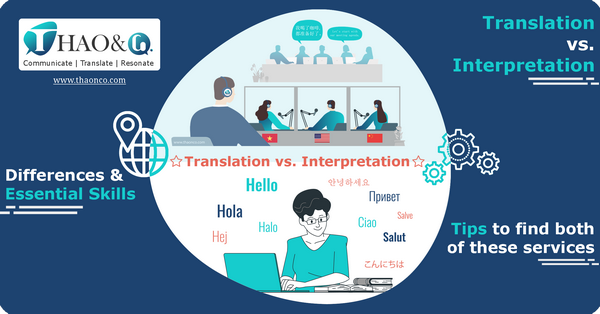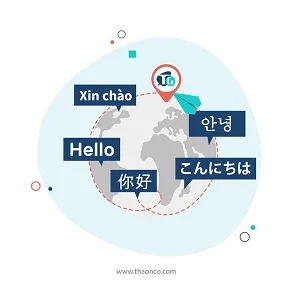In this ever-evolving global landscape, the art of communication through languages has become critically important. With diverse cultures and languages, the demand for professional translation and interpretation services is increasing steadily. But how do you find reliable, high-quality, and appealing translation and interpretation services? To find the answer, let’s dive into the distinctions between these two services with Thao & Co.
Translation and interpretation are crucial aspects of language services, and they differ in the methods through which information is conveyed. Both require a passion for language and a profound knowledge of the source and target languages and cultures. Here are the key differences between these two language services.
Translation and interpretation are two important tasks involving the conversion of content from one language to another. Translation is the process of converting text or content from a source language to a target language. This is done by translators with good writing skills and extensive knowledge of both languages. They have to ensure that both the meaning and sentence structure are meticulously transferred to convey the message seamlessly and effectively.
Interpretation is the real-time form of translation. Interpreters need to listen and swiftly grasp information, then immediately convey it from the source language to the target language. They use spoken words to communicate the meaning and message of the source language to the listeners.

Both translation and interpretation, despite their methodological differences, share the common goal of facilitating communication and understanding among different languages and cultures. Thanks to the contributions of translation, people can explore the world without language barriers, fostering connection and bringing people together.
In international conferences, interpreters transform a multilingual dialogue into a place where international participants can interact and exchange ideas. However, the role of interpretation extends beyond international events. When you visit a foreign country, an interpreter can become a trustworthy guide, helping you explore the local culture and creating memorable travel experiences.
While interpreters deftly manage verbal communication, translators are the sculptors of words, crafting quality translations by converting documents and texts from the source language to the target language using their deep understanding of linguistic nuances.
Both of these language services have distinct objectives that demand linguists to possess specific skill sets. For translation, absolute precision is essential to convey the meaning of the original text. Translators work meticulously to ensure that the information is not altered or lost during the translation process, especially in translating complex documents in legal, medical, technical, or other specialized fields.
Interpreters, on the other hand, need speed, sharpness, and flexibility. They must be able to listen and analyze information rapidly, and then interpret it immediately without disrupting the flow of conversation. This often applies in live situations such as conferences, meetings, speeches, or live broadcasts. Interpreters must balance accuracy and swift delivery to ensure the information is precisely and fully transferred in a short amount of time.

The rate of translation often depends on the number of words (for alphabetic languages such as English and French), characters (for logographic languages such as Korean and Japanese), or in some cases, the number of pages in the source text. Translation companies often price their services by words, characters, or pages to make the cost calculation straightforward and transparent.
However, in interpretation, fees are typically calculated by hours, sessions, or working days since the complex nature of this work requires substantial time and effort. Interpreters need to listen and analyze information, and then instantly interpret it while interacting with speakers and anticipating solutions for unexpected problems.
Furthermore, there are more factors that can affect the pricing of both translation and interpretation services, such as content complexity, rare languages, urgency, and other special requirements. Therefore, determining the final cost for translation and interpretation is typically based on these factors and the agreements between the translation agency and the client.
While translators and interpreters share some common skills, the differences between the two should not be overlooked. Translators rely primarily on writing skills to accurately and elegantly convert text. They also need a profound understanding of languages, attention to detail, meticulousness, and patience. A good translator requires creativity, localization skills, and the ability to stay updated with new knowledge and technology to excel in their work.
For example, for our Project Comercio, Thao & Co. was tasked with translating the website and marketing content for Trade360, a trading platform for currency pairs, commodities, stocks, CFDs, and indices. Combining expertise in banking and finance with optimizing UI elements was indeed a challenging task. We prioritized quality and accuracy through the development of a standardized Keyword Glossary and thorough review. High-quality translation serves as a solid foundation for UI optimization. Thanks to this, we succeeded in ensuring maximum translation consistency, accuracy, and compatibility with app features.
Interpreters, on the other hand, focus on listening and rapidly conveying messages accurately. They also require flexibility, excellent stress management, and the ability to communicate non-verbally.
Our work in Project Charm is a powerful testimony to our vast experience in interpretation. Specifically, this project involved interpretation for a legally sensitive internal investigation conducted by Kirkland & Ellis. Legal projects typically require high confidentiality, so interpreters are often not provided with specific reference materials beforehand. Faced with the tense and extended nature of multi-hour interpretation sessions, our experienced team of interpreters, well-versed in the legal field, successfully conducted 20 employee interviews in one week.
Choosing reliable translation and interpretation services can become easier by adhering to the following basic principles.

At Thao & Co. Translation Company, we take pride in being a trusted partner to meet all your translation and interpretation needs. Our team of expert linguists not only possesses exceptional translation and interpretation skills but also extensive expertise and an understanding of diverse cultures.
We are committed to delivering accurate, precise translations that effectively convey your message. Beyond mere language conversion, Thao & Co. leverages creativity to ensure that your company’s message is faithfully conveyed and resonates with your target audience. We understand that every translation project is an opportunity to connect and make a lasting impression.
With Thao & Co.’s translation and interpretation services, you can be confident in our service quality and professionalism. Contact us at our Get A Quote page for prompt consultation completely free of charge.